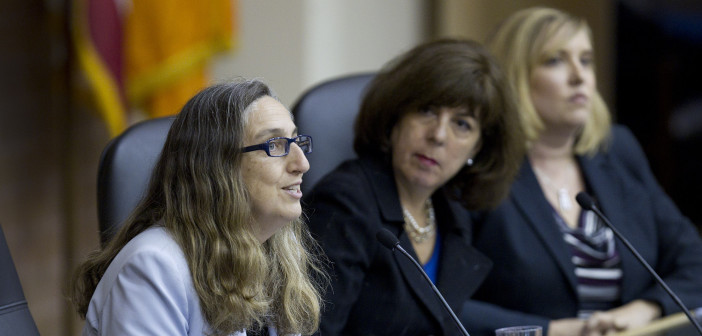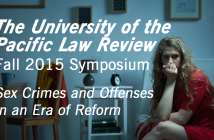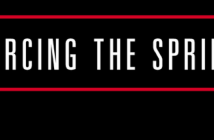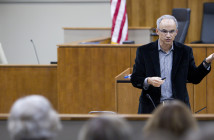Note: On Sept. 17, 2014, The Fair Political Practices Commission and the University of the Pacific, McGeorge School of Law Capital Center co-hosted a morning of spirited dialogue examining 40 years of political reform in California. The event featured prominent speakers discussing and debating the past, present, and future of the landmark 1974 initiative, the California Political Reform Act, that created the FPPC and made California a national leader in regulating campaign finance, conflicts of interest, and governmental ethics.
This article summarizes the panel “The Act in Present Day.”
The morning’s second panel,“The Act in Present Day,” featured Mary-Beth Moylan, professor at Pacific McGeorge School of Law, Karen Getman, partner at Remcho, Johansen & Purcell, and Erin Peth, Executive Director of the Fair Political Practices Commission.
When asked about the most challenging issue regarding political reform, Moylan identified the need for reformers to seek a constitutional balance when restricting the role of money in politics. Getman went a step further, stating that the very concept of political reform is an oxymoron that brings together the conflicting notions of maintaining freedom of speech and placing controls on political activity. She believes that a complete reexamination of the principles behind political reform may be necessary in order for effective reform to continue. Peth suggested that technology must play a bigger role in political reform efforts, particularly to allow citizens to easily access information regarding campaign finance.
The panel also discussed the current role of independent expenditures in elections and the impact of the U.S. Supreme Court’s decision in Citizens United v. Federal Election Commission, a 2010 case on campaign spending. The Court held that the federal government could not limit political expenditures by corporations, but Moylan believes this did not directly impact the prevalence of independent expenditures because this type of political spending was already common before the landmark ruling was handed down.
However, independent expenditures are still a source a tension, says Moylan, because individual voters may be less able than corporations to participate in political dialogue and may be uncomfortable with the amount of money spent on election campaigns.
Getman believes the primary focus regarding independent expenditures should be monitoring coordination. Although anyone can make an independent expenditure, it cannot be coordinated with candidates or their controlled committees. According to Getman, as campaigns become more expensive and more reliant upon television advertising, candidates need greater amounts of financial support. As long as they are not officially coordinated, says Getman, independent expenditures can fill this need.
On the topic of political advertising on television, the panel discussed how reformers have sought to increase transparency. According to Peth, California’s regulations affecting campaign communications are “piecemeal” as a result of constant advances in technology and the law’s attempt to evolve with the times. This area of political reform, says Moylan, is crucial and “must be done well for voters.”
Though California now requires that all political advertisements state who paid to air the advertisement, Getman doubts that this rule is an effective way to increase transparency. The complex regulations on political advertising, says Getman, have the unintended consequence of driving up costs for campaigns. According to Getman, this effect undermines political reform efforts, which often seek to diminish the role of money in politics.
The panelists agreed that regulation of lobbying is an area in need of attention and reform. The FPPC, says Peth, has stepped up its enforcement of lobbying regulations in recent years. However, regulations are not always clear as to what constitutes lobbying and who must register as a lobbyist. Moylan highlighted this ambiguity, suggesting that reformers must bring clarity to the issue.
A real-time electronic poll, where over 200 audience members used remote devices to vote, revealed that 62% believe current law does not require enough disclosure by lobbyists.




